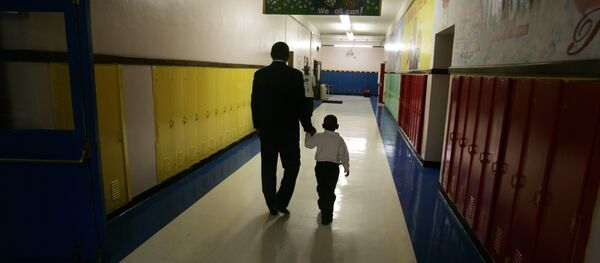Radio Sputnik’s Loud & Clear sat down with Kenneth Reed, spokesman for the Detroit Coalition Against Police Brutality, and Wesleyan University professor Kali Nicole Gross, about the roots of current tensions between black America and police, and whether the forums have credibility within the community.
Gross said the forums "seem like a really hollow response to where the country’s at, at this point. People have made serious demands in terms of real change. Number one on that list needs to be police accountability."
She discussed the 2014 case of Aiyana Stanley Jones, a seven-year-old girl, who was killed in her sleep by Detroit officer Joseph Weakley and a SWAT team while serving a no-knock warrant at her grandmother’s house. They were looking for a man said to be involved with the child’s aunt, who stayed in the same flat.
"Now that officer was not convicted of any crime, despite the fact that he initially tried to blame the grandmother, saying she tried to reach for the weapon, those things were disproven. He beat an involuntary manslaughter charge and a charge for reckless discharge of a firearm. There’s no accountability for police officers when they kill black people, it’s unacceptable. Even an innocent child, seven years old, asleep in her bed, cannot get justice. As far as I’m concerned, until there is justice in the Aiyana Stanley Jones case, I don’t think we can expect justice for any of these cases."
Loud & Clear host Brian Becker pointed out that after the police killing of Alton Sterling in Baton Rouge, the FBI, through the Justice Department, issued warnings of “anti-police riots,” tacitly encouraging brutality against peaceful protesters, resulting in the arrest of nearly 200 people the weekend after Sterling’s death.
Reed said that police in Detroit were similarly placed on high alert after the Baton Rouge shooting. "After what occurred with Philando Castile and Alton Sterling," he said, "the chief of police issued a heightened alert status for the officers, (even though) there’s been no credible threats that we knew of. There’s already tension between police officers here in Detroit and the community. So anyone that thinks everything is hunky dory here, that’s a false narrative. There’s a lack of trust."
Gross added that social, political and economic issues that plague black America factor into police misconduct and are routinely unacknowledged.
"There's sort of a 'one response fits all' when there are issues in the black community and its primarily criminalization and incarceration and also brutality," Gross said. "It’s not addressing systemic bigotry, inequities in housing and education and job growth for the most impoverished sectors of our community. The response is always this militarized, brutal sort of policing."




